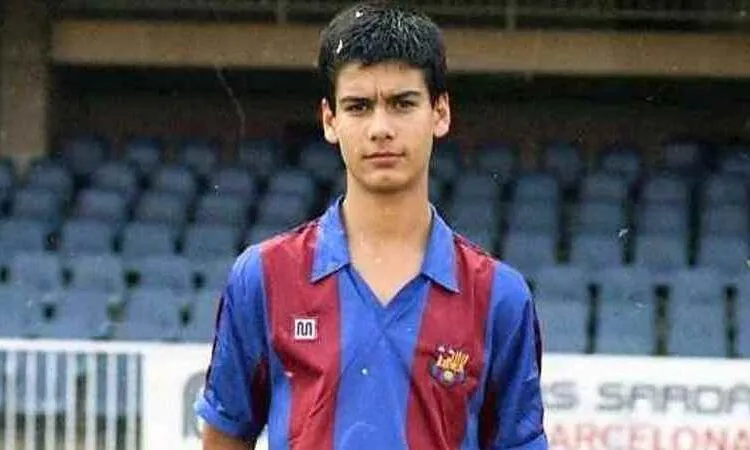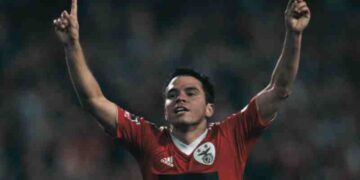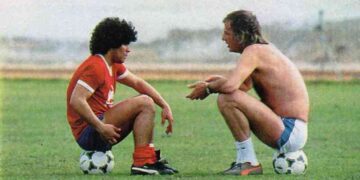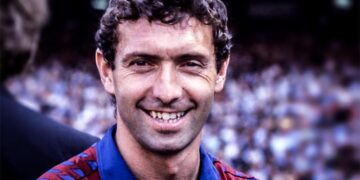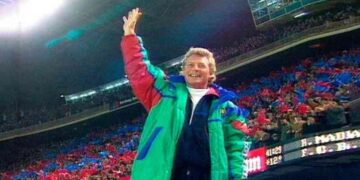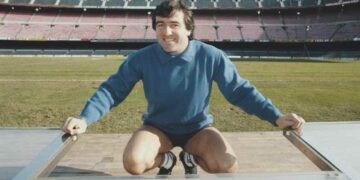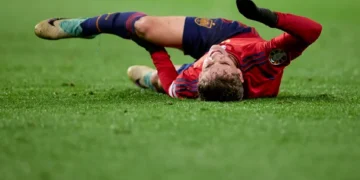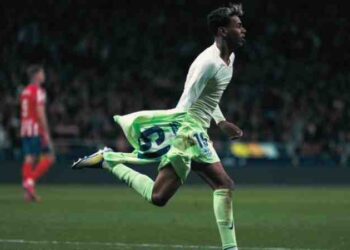In 1984, at the age of 13, Barcelona-born Pep Guardiola arrived at La Masia. Under the guidance of the academy’s coaches and mentors, Pep flourished as a footballer. His exceptional football intelligence, precise passing, vision, and ability to read the game stood out among his peers. Throughout the next six years, he progressed through the ranks of the youth teams. Demonstrating his potential and commitment to the Barcelona way of playing, he was eventually deemed ready to contribute at the highest level.
The Making of a Blaugrana Legend
In the 1990/91 season, Josep Guardiola’s dream came true. He was promoted to FC Barcelona’s first-team squad by then-coach Johan Cruyff. His official debut for the senior team came on December 16,1990, in a match against Cádiz CF. Guardiola’s impact was immediate, and he quickly established himself as an influential midfielder for Barcelona. Throughout his playing career at Barcelona, Guardiola embodied the club’s philosophy, known as “Més que un club”, and played a pivotal role in the team’s success during the 1990s. He was an integral part of the “Dream Team” under Johan Cruyff, which won
four consecutive La Liga titles from 1991 to 1994. His tactical awareness, leadership qualities, and exceptional passing ability made him a central figure on the pitch.
One of the defining moments of Josep Guardiola’s career as a player came on May 20, 1992. Barcelona faced Sampdoria in the final of the European Cup. Guardiola played a crucial role in the heart of Barcelona’s midfield, orchestrating the team’s play in a tightly contested affair. Ronald Koeman scored a stunning strike in the 112th minute of the game. Barcelona lifted their first ever European Cup and Johan Cruyff’s “Dream Team” cemented its legendary status.
As a key component of such a successful squad at just 21 years old, Pep Guardiola demonstrated how a talented and homegrown player, nurtured at the club’s academy, could make a significant difference in the biggest stages of European football. This made him a living testament to the power of youth development. Moreover, a symbol of hope for aspiring young players around the world, leaving a lasting impression on football enthusiasts everywhere.
Leaving Barcelona
After 17 years of serving the club, Pep made the decision to part ways with Barcelona in 2001. Struggling with various injuries and surgeries, the demands of top-level football took their toll. Despite going trophyless in his final season as a Barcelona player, Pep left the club as one of the most successful players in the history of the club. 479 matches played and 19 trophies, including a European Cup and six League Titles. The La Masia product-turned-first-team captain left the club with his head held up high.
Welcome Back, Pep!
After failing to win any major trophies for two years in a row, Barcelona underwent a remarkable transformation under the guidance of Pep Guardiola. The team was revitalized, and there was an emphasis on promoting young talents from the club’s academy. This decision to blend youth with experience turned out to be a masterstroke. It laid the groundwork for the team’s future success. On top of that, he was determined to instill a strong sense of discipline, teamwork, and possession-based football, cleansing the squad of any members that didn’t comply with the new program.
In his debut season as head coach, Guardiola led Barcelona to unprecedented success, making sure the club didn’t regret the decision to promote him to the first team once again. With a memorable 2-0 triumph over Man United in the 2009 UCL Final, Barcelona’s season had a perfect ending. That, alongside a league and cup title, meant Barcelona had won a treble for the first time in the club’s history, later becoming the first team to ever win a sextuple.
Beyond the trophies, Guardiola’s influence on individual players was also noteworthy. He nurtured and refined the talents of stars like Lionel Messi, Xavi Hernandez, Andres Iniesta, Sergio Busquets, and Gerard Piqué, helping them reach new heights in their careers. Remarkably, Lionel Messi won the Ballon d’Or in each of the 4 years he played under Pep Guardiola. In 2010, for the first and only time in the history of the sport, three players from the same club took the podium. Xavi came third, Iniesta second, and Messi won, while Pep had the honor of personally handing the golden ball to his star player.
Football’s Peak
Pep’s Barcelona was a consistent competitor at the top level. However, it was during the 2010/11 season that they reached new heights with their signature playing style known as “tiki-taka.” Barcelona’s influence on the sport during that season was profound. Their possession-based playing style left a lasting impact on football philosophy and tactics worldwide. Coaches and teams across the globe sought to replicate their success by emphasizing technical proficiency, intelligent movement, and collective teamwork. Pep Guardiola’s tactical brilliance and ability to mold individual talents into a cohesive unit were evident throughout the season. His coaching acumen was a key factor in Barcelona’s triumphant run, and he solidified his reputation as one of the most sought-after managers in football.
When it seemed like the team couldn’t possibly play any better, they did exactly that. On May 28th, 2011, at Wembley Stadium, Pep’s Barcelona left the world of football in awe. With the ball constantly circulating among Barcelona’s players, Manchester United found themselves struggling to breathe in a Champions League Final. The attack was brutal, the defense was equally impressive; pressing high up the pitch to disrupt Man United’s buildup play and quickly regaining possession. Barcelona demonstrated incredible teamwork, seamlessly interchanging positions, and anticipating each other’s movements. Their remarkable understanding on the field was a testament to the unity and cohesion fostered within the team. With the way Pep’s team was playing, the winner was never in question. Barcelona lifted the trophy after a 3-1 victory, with a performance hailed as one of the greatest ever seen on a football pitch.
Pep Guardiola at the core of it all.
In my time as manager, it’s the best team I’ve faced. I think everyone acknowledges that, and I accept it.
Sir Alex Ferguson
The End of an Era
Pep’s final season as the head coach of Barcelona was certainly a chaotic one. Disagreements with the board, lack of motivation, mental fatigue… Pep’s exit was a result of many factors.
Having already won every trophy multiple times in his first three seasons, a decrease in the players’ hunger was evident. The team was facing their biggest opponent yet: burnout.
On top of that, Pep wasn’t happy with the level of autonomy and control he had over footballing matters. Guardiola had a clear vision for the team’s direction, including player transfers, youth development, and overall footballing strategy. However, there were reported disagreements between Guardiola and the new board, with Sandro Rossel on the throne, over certain transfer decisions and the club’s transfer policy. This discrepancy in approach led to tensions between the coach and the board.
Ultimately, personal reasons also played a part in Guardiola’s decision to step down as Barcelona’s manager. After four intense and successful seasons at the helm, he felt that it was time for a change and a break from the high-pressure environment of managing a top club.
In April 2012, Guardiola made the announcement that this would be his final season as the Blaugrana manager. His decision to leave the club was met with sadness, as he had become an iconic figure during his time as the head coach. A week later, in Pep’s final game at the Camp Nou, Messi scored all four goals in a 4-0 victory over Espanyol. He celebrated one of his goals by running toward the maestro that took his football to a new level throughout the time they spent as collaborators.
To this day, Guardiola’s legacy at Barcelona continues to be celebrated as one of the greatest chapters in football history. Barça elevated Pep and Pep elevated Barça.
Discover more from Barça Buzz
Subscribe to get the latest posts sent to your email.

